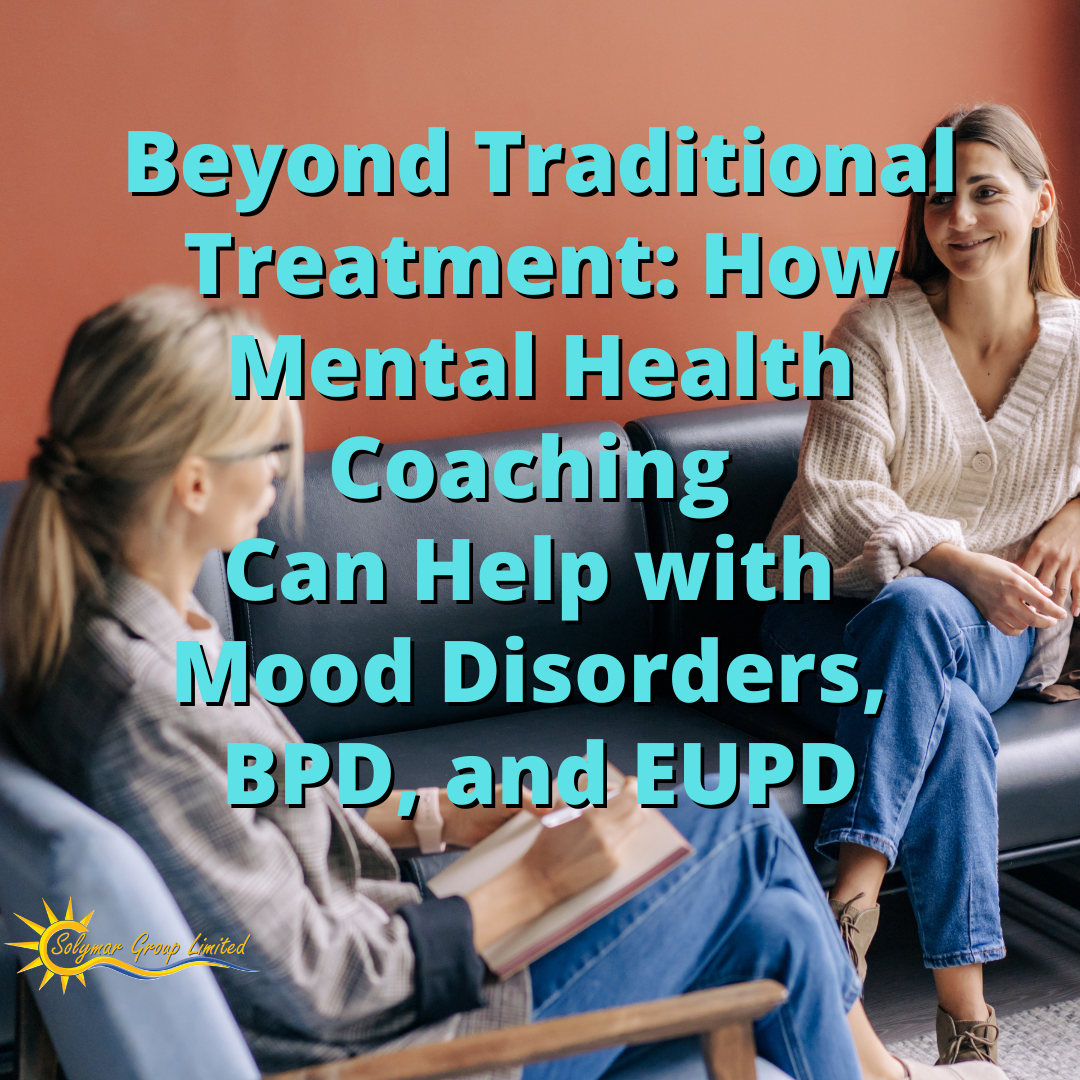 Mental health coaching is an evidence-based approach that helps individuals with mood disorders, borderline personality disorder (BPD), and emotionally unstable personality disorder (EUPD) to manage their mental health effectively. Mood disorders such as depression and bipolar disorder are characterized by persistent feelings of sadness or elation, while BPD and EUPD involve unstable relationships, self-image, and emotions. Mental health coaching can help individuals develop healthy coping strategies, reduce negative thoughts and behaviours, and improve overall well-being.
Mental health coaching is an evidence-based approach that helps individuals with mood disorders, borderline personality disorder (BPD), and emotionally unstable personality disorder (EUPD) to manage their mental health effectively. Mood disorders such as depression and bipolar disorder are characterized by persistent feelings of sadness or elation, while BPD and EUPD involve unstable relationships, self-image, and emotions. Mental health coaching can help individuals develop healthy coping strategies, reduce negative thoughts and behaviours, and improve overall well-being.
In this article, we will explore the ways in which mental health coaching can help individuals with mood disorders, BPD, and EUPD. We will also examine the evidence supporting the effectiveness of mental health coaching for these conditions.
Mood Disorders
Mood disorders, including depression and bipolar disorder, affect millions of people worldwide. They are characterized by persistent feelings of sadness or elation, which can significantly impact an individual's quality of life. Mental health coaching can be an effective approach to managing mood disorders by helping individuals develop healthy coping strategies.
One way that mental health coaching can help with mood disorders is by teaching individuals how to identify and challenge negative thoughts. Negative thoughts, such as self-criticism or pessimism, can worsen depression and anxiety symptoms. Mental health coaches can teach individuals how to identify negative thoughts and replace them with positive, realistic thoughts. This can help individuals feel more in control of their thoughts and emotions and reduce symptoms of depression and anxiety.
Another way that mental health coaching can help with mood disorders is by teaching individuals how to develop healthy coping strategies. Coping strategies are behaviours or actions that individuals use to manage stress and difficult emotions. Mental health coaches can teach individuals how to develop healthy coping strategies, such as exercise, mindfulness, and social support. These strategies can help individuals manage their symptoms of depression and anxiety and improve their overall well-being.
There is evidence supporting the effectiveness of mental health coaching for mood disorders. A study published in the Journal of Affective Disorders found that a brief coaching intervention was effective in reducing symptoms of depression and anxiety in individuals with mild to moderate depression. The study found that individuals who received coaching had significantly lower levels of depression and anxiety compared to those who did not receive coaching.
Borderline Personality Disorder (BPD) and Emotionally Unstable Personality Disorder (EUPD)
BPD and EUPD are characterized by unstable relationships, self-image, and emotions. Individuals with BPD or EUPD may struggle with regulating their emotions, which can lead to impulsive behavior, self-harm, and suicidal ideation. Mental health coaching can be an effective approach to managing BPD and EUPD by helping individuals develop healthy coping strategies and regulating their emotions.
One way that mental health coaching can help with BPD and EUPD is by teaching individuals how to regulate their emotions. Mental health coaches can teach individuals techniques for regulating their emotions, such as deep breathing, mindfulness, and cognitive reappraisal. These techniques can help individuals manage intense emotions and reduce impulsive behaviour.
Another way that mental health coaching can help with BPD and EUPD is by teaching individuals how to develop healthy boundaries in their relationships. Individuals with BPD or EUPD may struggle with maintaining healthy relationships due to their fear of abandonment or rejection. Mental health coaches can help individuals develop healthy boundaries by teaching them how to communicate effectively and assertively.
There is evidence supporting the effectiveness of mental health coaching for BPD and EUPD. A study published in the Journal of Personality Disorders found that mental health coaching was effective in reducing symptoms of BPD in individuals who had completed a dialectical behaviour therapy (DBT) program. The study found that individuals who received coaching had significantly lower levels of BPD symptoms compared to those who did not receive coaching.
Conclusion
Mental health coaching is an effective approach to managing mood disorders, BPD, and EUPD by helping individuals develop healthy coping strategies, regulate their emotions, and improve their overall well-being. Mental health coaches can work with individuals to identify their unique needs and develop personalized treatment plans that address their specific challenges.
In addition to the evidence supporting the effectiveness of mental health coaching, there are several other benefits to this approach. Mental health coaching is a collaborative and client-centered approach that focuses on the individual's strengths and goals. It emphasizes empowerment and self-efficacy, allowing individuals to take an active role in their own mental health treatment. Mental health coaching also provides individuals with ongoing support, which can be particularly beneficial for those who may not have access to traditional mental health services.
It is important to note that mental health coaching is not a substitute for medical or psychiatric treatment. Individuals with mood disorders, BPD, and EUPD should work with their healthcare provider to develop a comprehensive treatment plan that addresses their unique needs. However, mental health coaching can be a valuable complement to traditional treatment approaches, providing individuals with additional support and resources.
In conclusion, mental health coaching is an evidence-based approach that can help individuals with mood disorders, BPD, and EUPD to manage their mental health effectively. By teaching individuals healthy coping strategies, regulating their emotions, and improving their overall well-being, mental health coaching can empower individuals to take an active role in their own mental health treatment. With ongoing support and personalized treatment plans, mental health coaching can help individuals achieve long-term success in managing their mental health.
Hashtags: #mentalhealthcoaching #mooddisorders #BPD #EUPD #evidence-basedapproach #healthycopingstrategies #regulateemotions #self-efficacy #collaborativeapproach #ongoingsupport #personalizedtreatmentplan






